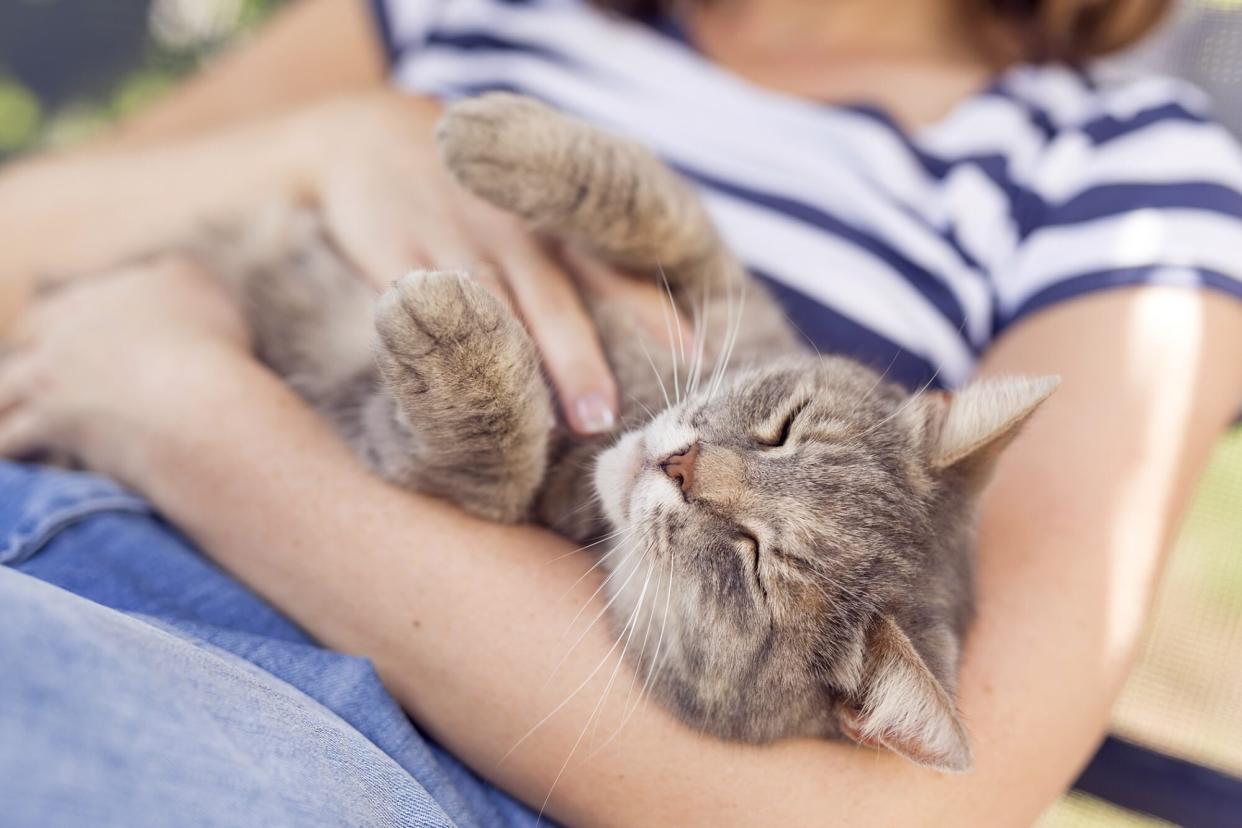How Much Sleep Do Cats Need? A Lot, Experts Say

vladans / Getty
You want to spend every waking minute with your cat. But, it seems, your cat has other plans for her day. And that includes sleeping here, sleeping there, and taking a cat nap in the chair. With so few waking moments it's not uncommon to wonder exactly how much sleep cats really need each day.
Perhaps, though, you've been treated to late-night zoomies and early-morning breakfast begs, leaving you to wonder if your cat ever slows down. Cats can sleep anywhere from 12 to 20 hours per day, and the range varies so much based on their lifestyle. Samantha Bell, cat expert at Best Friends Animal Society in Los Angeles, is here to help put these cat nap questions to rest.
How Much Sleep Do Cats Need Each Day?
According to Bell, indoor and outdoor cats have different sleeping requirements. And this makes sense, considering kitty ancestors adapted to a crepuscular cycle prime for hunting. "Outdoor cats need to wake up at times that are best for hunting, which is just before dawn and around sunset," Bell explains. Their prey is small, so they need multiple naps per day to have the energy to chase down an afternoon snack—or three.
Because house cats aren't hunting for their meals or on high alert for passing predators, "they can snooze whenever and wherever they please," Bell says. And if we're lucky, they'll choose to snooze through the night with us.
Here's how much sleep cats need per day, according to their age:
Kittens
Kittens aren't just good at being stinkin' cute—they're also skilled at racking up the ZZZs. Itty bitty newborn kittens sleep almost all day long, Bell says. As they develop, their naps will decrease to about 22 hours and then level off to around 20 hours per day.
Adult Cats
"Adolescent cats' bodies are changing so much that their sleeping patterns are as wild as they are," Bell says. As they settle into their adult years, cats typically sleep for 12 to 20 hours a day. She notes that this number can vary pretty widely based on their lifestyle. And like many of us, cats tend to sleep more when they're bored and in the dark winter months.
Senior Cats
It's back to those kitten antics, Bell says. Well, at least when it comes to frequent naps. "Senior cats sleep as much as they did when they were kittens, about 20 hours a day," she says. Bell adds that no matter what age your cat is, they're likely not sleeping all these hours at once but instead taking little cat naps that last about an hour each.
As for what's going on in their kitty brain when they're sleeping—dreaming, probably, Bell says. Unless they're faking sleep. "Cats sometimes feign sleep. We see this in cats who are shut down and not wanting to interact with their environment," Bell explains. She notes that this is different than a happy cat cycling in and out of light and deep sleep.
By the way, you might notice when your cat has entered a deep rapid eye movement (REM) sleep cycle by their twitching, which is thought to be dream-induced.
RELATED: Why Does My Cat Sleep on My Head and Face?
What To Do If Your Cat's Sleep Habits Change
If your cat is sleeping less or more than usual, the first thing to do is take her to the veterinarian. "They could be sleeping more due to pain, dental issues, arthritis, diabetes, or depression," Bell says. If you have a senior cat, a change in sleeping habits could point to feline cognitive dysfunction, which is like Alzheimer's disease in pets. Don't skip sharing any details about other unusual behaviors in your cat, even if they seem insignificant.
If your cat has a clean bill of health, then it's time to assess their lifestyle and environment. A lack of sleep could mean something in your cat's environment is keeping her up—like her favorite bed being placed in a high-traffic spot or feeling on-edge about a new family member.
She also might be too wired to sleep or too bored to keep her eyes open, Bell says. And the cure is enrichment, enrichment, enrichment.
Play with your cat twice a day for 10 to 15 minutes each session.
Enrich their environment with cat shelves, trees, scratching posts, and toys they can play with by themselves.
Feed high-protein meals at least twice a day or as directed by your veterinarian.
Play with your cat just before bed, following the play session with a small meal or snack.
"Just remember that it's normal and okay if your cat sleeps 20 hours a day," Bell says. Just be sure to fill those mere four waking hours with love and enrichment. "Wand toys, puzzle feeders, training—whatever makes your cat happy will encourage them to want to be awake more," she says.
RELATED: Can Cats See in the Dark? How a Cat's Night Vision Differs from Humans

